 Waiting for the child is an important and welcome event in thelife of every woman. During pregnancy, the maintenance of one's own health should become the main goal of the future mother, because at this time the main inclinations of the baby's health are laid. Even 20 years ago bronchial asthma and pregnancy were incompatible. But today leading experts are unanimous: this disease is not a contraindication for pregnancy. Bronchial asthma is a common lung disease in pregnant women, which can manifest before pregnancy or during the first trimester. The main thing is not to give up medications and not to stop treatment for all nine months. If you follow all the recommendations of your doctor, there will certainly be no complications.
Waiting for the child is an important and welcome event in thelife of every woman. During pregnancy, the maintenance of one's own health should become the main goal of the future mother, because at this time the main inclinations of the baby's health are laid. Even 20 years ago bronchial asthma and pregnancy were incompatible. But today leading experts are unanimous: this disease is not a contraindication for pregnancy. Bronchial asthma is a common lung disease in pregnant women, which can manifest before pregnancy or during the first trimester. The main thing is not to give up medications and not to stop treatment for all nine months. If you follow all the recommendations of your doctor, there will certainly be no complications.
Treatment of bronchial asthma
Planning a pregnancy, a woman who knows about herillness, should consult with your doctor, which medications you can take during pregnancy, and which you can not, get a blood pressure monitor to always monitor your blood pressure. Doctors say that in women with bronchial asthma, the pressure is much higher, even if they have never encountered this phenomenon before pregnancy. In cases of exacerbation of the disease, you should immediately consult a doctor. Many women neglect the advice of specialists, since they do not trust modern methods of treatment. And very vain - in this situation, self-medication can cause irreparable harm. And not only the future mother, but her baby. There are many myths about the treatment of asthma, because not so long ago there were no medications controlling this disease. Many are still convinced that asthma is a disabling disease, in which it is impossible to have children. At the end of the last millennium, the treatment was reduced to numerous droppers, hormones and theoephedrine, and inefficient use of the first inhalers often ended unsuccessfully. Now the state of things has changed dramatically, although the disease is still not cured. Thanks to new ideas about the nature of asthma, a number of effective drugs have been developed and methods for controlling the course of the disease have been developed. To achieve positive results, the joint efforts of specialists and their patients are needed. During pregnancy, the severity of the disease often changes. About 35% of women with bronchial asthma have an improvement in the first trimester, a third - worsens, in others - remains unchanged. However, scientific analysis indicates other data - the improvement of the disease is observed only in 14% of pregnant women. Therefore, do not rely on the will of the case when it comes to your health and the health of the unborn child. Every pregnant woman tries to minimize the intake of medications and this is justifiable. But to treat bronchial asthma is necessary: the harm that this disease can bring, as well as the hypoxia caused by it, is much more than possible side effects of medications. And if there is an exacerbation of asthma, then there is a risk of life risk for the future mother. Each woman faces a difficult choice, which she must make in favor of systematic treatment, according to all the recommendations of the doctor. Close interaction with a doctor is one of the most important conditions for the successful treatment of asthma. An experienced specialist will select a treatment that will help to achieve maximum results with minimal risk. Treatment during pregnancy is prescribed by the principle - "the expected benefit should exceed the possible risk to the fetus and the mother." The most stringent requirements are guided during the first trimester of pregnancy, since this is the most vulnerable period. In the treatment of asthma, topical (locally applied) inhalation drugs are used, since the concentration of the drug in the blood will be minimal, and the local effect for the treatment of bronchi is maximum. The best solution is to use inhalers that do not contain freon. To reduce the risk of side effects, aerosol inhalers with a spacer should be used. It is established that during pregnancy and bronchial asthma, pathological changes occur in the immune system - it is weakened. And this is quite natural, because otherwise a woman would not be able to bear a child. But this stick is about two ends, unfortunately. Such a decrease in immunity has a negative effect on the course of the disease. The constant presence of the inflammatory process in the bronchi causes the arising symptoms. It is necessary to treat not only the symptoms of the disease (eliminate bronchial spasms), but also asthma itself, whose treatment is based on basic therapy (drugs for disease control). Treatment should be aimed at controlling inflammation, as well as selecting the necessary medications to alleviate the symptoms and eliminate exacerbations. Depending on the severity of asthma, the doctor determines the amount of basic therapy the doctor. Rational basal therapy will help reduce the risk of exacerbations and reduce the use of drugs to relieve symptoms. 
Types of bronchial asthma
In some cases, asthma can haveNon-allergic origin - due to endocrine changes or severe head injuries. However, in most cases, the disease is allergic, when the effect of an allergen accompanies a spasm of the bronchi, which is manifested by asphyxiation. There are two main forms of bronchial asthma:
- Infectious-allergic
Disease develops against such infectiousdiseases of the respiratory system like pneumonia, tonsillitis, pharyngitis and bronchitis. In this case, allergens are microorganisms. This form of the disease is the most common.
- Non-infectious-allergic
An allergen can be a series of substancesorganic and inorganic origin: dust, plant pollen, feathers, human dander, animal hair, food allergens (strawberries, citrus fruits, strawberries), medicinal substances and industrial chemicals. The emergence of a similar form of bronchial asthma is interrelated with a hereditary predisposition.
Symptoms of the disease
Whatever form bronchial asthma has, it is characterized by 3 stages of development:
- PEDAGASH
- Stage of asthma attacks
- Asthmatic status.
In case of pregnancy and bronchial asthmathere are all these forms. At the first stage there is chronic pneumonia with bronchospasm, as well as chronic asthmatic bronchitis. Attacks of suffocation are not yet available. At the initial stage, they develop periodically. As a rule, with an infectious-allergic form of asthma, attacks of suffocation appear as a result of chronic diseases of the lungs or bronchi. Recognize the attacks of suffocation is quite simple: they begin at night and last for several hours. Patients before the onset of attacks feel tingling in the throat, tightness in the chest, sneezing and runny nose begins. No sputum, cough paroxysmal. A woman, in order to breathe, it is necessary to sit down, strain all groups of muscles of the neck and thorax. Breathing becomes hoarse, whistling, noisy, audible from a distance. The skin becomes covered with perspiration, the face becomes a cyanotic color. By the end of the attack, liquid and abundant sputum is secreted. Pregnant women who have not had asthma attacks before pregnancy often do not understand what is happening to them and are frightened. Panic in this case is unacceptable, as it can aggravate an attack. Try to calm down and immediately call a doctor. By the way, for the first time seizures can develop in any period of pregnancy. But most often cases of asthma in the first trimester. But do not get too upset - the asthma that appeared in the beginning of pregnancy can disappear in the period of the second trimester and the prognosis for the mother and the child is very favorable. Asthmatic status is accompanied by severe attacks of suffocation, which do not stop for several hours and even a day. 
Features of the course of bronchial asthma during pregnancy
In pregnant women with bronchial asthmaoften in the early toxicosis - in 36% of cases, the threat of termination of pregnancy is observed in 27%, violations of the birth function - in 19% of cases, rapid delivery and as a result, the risk of birth trauma - in 23% of patients. In pregnant women with asthmatic status of bronchial asthma, a high percentage of premature births, spontaneous miscarriages and cesarean sections are possible. In case of inadequate treatment, fetal deaths are noted. In term pregnancy, women with bronchial asthma give birth in a natural way, as the attacks of suffocation during labor are not difficult to prevent. And in general - during childbirth the likelihood of asthma attacks is low enough, especially if during this period a woman took glucocorticoid drugs (hydrocortisone or prednisolone), bronchodilators (ephedrine or) euphyllin. If asthmatic conditions and severe attacks of suffocation are observed, then an early delivery is recommended on the 37th week of pregnancy.
Postpartum course of the disease
After delivery, there is an improvement in the courseA bronchial asthma in 25% of women with mild disease. In the other 25% of the parturient women the condition worsens, the dose of prednisolone significantly increases. In most women, the condition does not change. Often, bronchial asthma can cause illness in the newborns of the upper respiratory tract. Often, the disease manifests itself in later years of the baby's life, in rare cases, asthma develops in the first months of life. Therefore, the children of those mothers who encountered asthma, the first year of life should be under close supervision of an allergist and pulmonologist. The earlier the pathology is revealed, the easier it will be to cope with it. 
Breast-feeding
Pregnant with bronchial asthma is necessaryconsultation with a specialist in the use of medicines during breastfeeding. If taking medication is mandatory, then they should be used at least 3.5 - 4 hours before the beginning of feeding, then their concentration in milk will be the least. Most drugs get into milk, so you can not ignore this fact. There are a number of drugs that can be taken to a nursing mother, but along with them, there are medications that should be avoided during breastfeeding during treatment. In any case, the final word should remain with your doctor.
Recommendations for the reduction of asthma attacks
To minimize triggering factors,provoking exacerbations of bronchial asthma, we bring to your attention the main potential sources that excite them. Triggers of asthma attacks with bronchial asthma: Household inhalant allergens are the most opposite - it is almost impossible to avoid contact with them. But still you need to try to at least reduce it to a possible minimum. Such allergens include:
- Products of livelihoods of domestic animals (traces of saliva, urine and wool);
- Products of life of cockroaches and colonies of dust mites (books, fur and carpet products);
- Spores of bacteria and mold fungi;
- Tobacco smoke;
- Pollen;
- Household chemicals.
Food allergens also occur frequently, butto struggle with them is easier - it is enough to exclude from the menu forbidden products. But, of course, you will be able to do this only if you know what foods you are allergic to. And it can only be done by a doctor.
- Citrus;
- Animal fats;
- Seafood;
- Honey and chocolate;
- Stabilizers and preservatives (nitrates, sulfites, nitrites).
Medicinal preparations, which result in the initiation of an allergic reaction:
- Aspirin;
- Beta-adrenoblockers, which have a pharmacological effect;
- Drugs prescribed for the treatment of coronary heart disease, myocardial infarction, heart failure.
Nonspecific factors:
- Excessive physical activity;
- High humidity of air;
- Temperature changes;
- Stress and prolonged depression.
In the presence of the above factors or situations, it is necessary to limit their impact during pregnancy. 
Prevention of complications of bronchial asthma
- It is necessary to abandon the products and medicines that cause an allergic reaction (reddening of the skin, rash in the form of urticaria, swelling, nasal congestion, mucous discharge, lachrymation).
- Before pregnancy planning is necessary,give up pets, no matter how much you dislike them. The products of their vital activity can be kept indoors for another six months, so it is necessary to thoroughly clean and get rid of all the harmful bacteria.
- Exclude from home interior potentialsources of dust: carpets, upholstered furniture, old books. If you can not refuse them, cover them with polyethylene covers to protect your own health.
- Choose a model of the air conditioner, which has the function of controlling the humidity of the air. This will save you from ticks and molds that can multiply at a humidity of over 60%.
- Regular wet cleaning of the room. It is advisable that a pregnant woman is not present at the same time, but spent free time in the fresh air.
- Bed linen should be washed at least once a week at a temperature of at least 60 ° C.
- The stove should be equipped with a hood.
- It is forbidden to contact with cigarette smoke, paintwork, fuel vapors and exhaust gases, which easily penetrate the body through the respiratory tract.
- In the workplace of a pregnant woman, there should not be allergens that can cause choking attacks.
- It is necessary to wash hands regularly, not to be overcooled, not to be in crowded places and drafts.
- If during pregnancy planning you havethere was an allergy, this should not be the reason for refusing it. If the allergy occurred during pregnancy, it would be more rational to wait for delivery, and then to conduct research for the presence of specific allergens.
And remember that bronchial asthma is notcontra-indication for pregnancy, and all the more reason for refusing to have children. The main thing to observe all the prescriptions of your doctor and to exclude the influence of allergens. A qualitative and regular control of bronchial asthma throughout the entire period of pregnancy is a pledge of the birth of a healthy child and the absence of complications in the mother. As you can see, pregnancy and asthma do not mutually exclude each other. Happy motherhood! We advise you to read:









